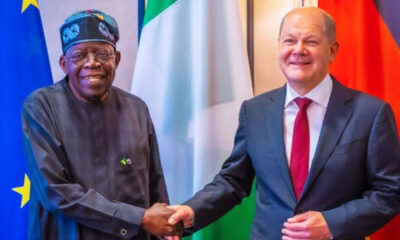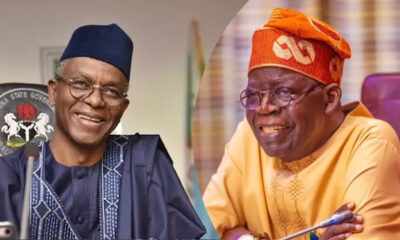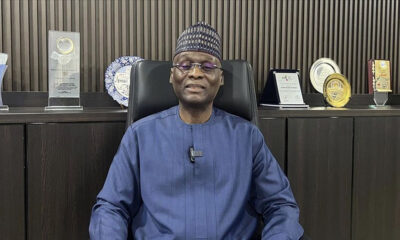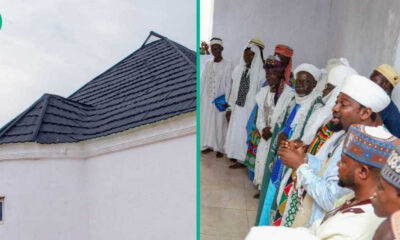Opinion
Farooq Kperogi : Neither Tinubu nor Atiku forged credentials with INEC

Farooq Kperogi : Neither Tinubu nor Atiku forged credentials with INEC
The storm over the legitimacy of the credential President Bola Tinubu submitted to INEC has managed to rope in former Vice President Atiku Abubakar who instigated it in the first place. But available facts show that neither of them presented forged documents to INEC.
I go where the facts lead me. That means I could say the opposite of what I said earlier in light of new facts, a reason I advisedly used the expression “the best obtainable version of the truth” in last week’s column. I am not invested in any perspective. Tinubu is an unrelieved catastrophe as a president, but I’ll defend the facts even if they favor him.
Here are 7 facts I’ve found so far after reading and rereading all the facts related to this issue:
1. Tinubu attended and graduated from Chicago State University in 1979, was issued a diploma (or a certificate, to use the expression that’s familiar to Nigerians), which he collected (I erred when I thought the registrar said he didn’t; See number 3). Apparently, he lost the original diploma in 1979 and was issued a “replacement diploma dated 27 June 1979,” according to the BBC.
2. In the 1990s, he applied for and got a replacement diploma from CSU. Ostensibly, because it looks different from his 1979 diploma (since diplomas bear the signatures of the current president and look like the diplomas issued that year), he got a note from the CSU registrar in 1999 affirming that he indeed graduated from the school in 1979.
3. He lost the original copy of the 1990s replacement diploma (but has a photocopy of it) and, in the 2000s, applied for yet another replacement diploma, which the university issued, but which he didn’t collect. I mistook the registrar’s reference to this bit during the deposition as him saying that Tinubu did not collecting his 1979 diploma. My apologies.
READ ALSO:
- Mohbad’s death : Coroner summons Naira Marley, Prime Boy, Sam Larry
-
Lagos govt arraigns alleged notorious land grabber for kidnapping, others
-
‘Bring killers of our members to book’ – Bolt, Uber drivers beg police
4. In 2022, Tinubu submitted a photocopy of the 1990s replacement diploma, along with the 1999 “To Whom It May Concern” note from the CSU Registrar, to INEC as the academic credential that qualifies him to run for president.
5. Opposition politicians saw it and said it wasn’t similar to diplomas CSU issued in 1979. So, they said it’s fake.
6. BBC’s Disinformation Team fact-checked the claim and found that it’s not fake. It appears fake only because it was reissued in 1998 and the university’s logo at the bottom of the diploma was chopped off during photocopying. The BBC says every other detail in the diploma is similar to the diplomas CSU issued or reissued in 1998.
7. The registrar disavowed the photocopied INEC diploma during deposition because of the absence of the logo of the university at the bottom of the diploma, but even he hinted that it “was possibly ‘cut off’ when it was photocopied.” So, it was actually a conditional disavowal.
The Foundation for Investigative Journalism (FIJ) attempted to impeach the credibility of the BBC fact check but failed.
The FIJ said, “Of particular interest was the expression, ‘with honors’, which appeared on the certificate Tinubu submitted to INEC. The presence of ‘with honours’ in Tinubu’s certificate is a tautology because the certificate goes on to read, ‘with all the rights, honours, and privileges partaining therto’.[sic]. None of the 1990s samples provided by CSU showed those words underneath the course of study, and this suggests that Tinubu’s certificate, which was supposedly obtained within the same timeframe, did not emanate from the school.”
That’s a problematic claim. “With all the rights, honors, and privileges pertaining thereto” is a fixed phrase that appears on all diplomas irrespective of their class. The addition of “with honors” isn’t a duplication because graduating with honors is an academic distinction that only a limited pool of students achieve, and some U.S. universities include it in diplomas in addition to the fixed phrase that appears on all diplomas.
In any case, Tinubu’s uncollected 2000s replacement diploma that the registrar showed during the deposition has both the fixed phrase AND “with honors.”
Similarly, the claim that the samples of replacement diplomas issued in the 1990s don’t have “with honors” is a weak argument because CSU only showed uncollected diplomas in its records, not a representative sample of every type and class of diplomas earned or re-issued that year. It could well be that the uncollected diplomas in CSU’s records didn’t achieve the distinction that entitles them to have “with honors” affixed to them.
READ ALSO:
-
Ronaldo sentenced to 99 lashes for hugging woman in Iran
-
Environmental infractions: Lagos shuts Mile 12, Owode Onirin markets
-
Internet fraud: International ‘catcher’ , accomplice jailed 16 years in Lagos
Typically, only between 20% and 30% of students graduate with honors in U.S. colleges and universities (except for Ivy League universities that have higher percentages), so it’s not a given that the uncollected diplomas in CSU’s records will be among the 20% to 30%.
FIJ also said, “Two, whoever created the controversial certificate in Tinubu’s possession copied the template of the 2000s without paying attention to timeframe variations. This is clear in one of the signatures on Tinubu’s certificate. The signature on the right is that of Zaldwaynaka “Z, the current President of CSU, who took office in 2018. A president who took office in 2018 could not have signed a certificate supposedly released in the 1990s.”
This claim seems made up because there is no “Zaldwaynaka Z” in the diploma Tinubu submitted to INEC. The photocopied CSU diploma Tinubu submitted to INEC and the samples of CSU diploma replacements from the 1990s are exactly the same except for the missing logo in Tinubu’s copy as a result of photocopying.
The registrar’s disavowal of the diploma doesn’t invalidate its authenticity because he merely said the photocopy that was shown to him didn’t look like diplomas from CSU because of the missing logo. People who have an emotional investment in the idea that Tinubu “forged” a diploma that he validly earned (which is ridiculously excessive legal literalism to begin with) leave out that context and make it seem as if the registrar’s words are an inviolable article of faith and not a conditional, context-dependent response to a specific question about a specific photocopied document that doesn’t reflect all the features of diplomas CSU issued in 1998 BECAUSE of photocopying.
This issue has demonstrated to me in starkly dramatic terms how partisan blinders can distort people’s perception of reality. When people so badly want something to be true, but it turns out to be untrue, they choose to hang on to the most absurd apophenic hallucinations (i.e., seeing predetermined patterns from a chaos of unrelated phenomena) they can invoke to validate their preconceptions. I’ve studied and taught this phenomenon for years but had never seen it manifest on a mass scale like this.
The only new thing that will change the conversation is a foolproof revelation that Tinubu didn’t meet graduation requirements and was issued a fraudulent transcript that said he did—after the fact—by dodgy university officials. That would establish the legal basis for forgery. Given what I am now reading about the school, I won’t be shocked if this happens. So, I think the answer to the puzzle isn’t on the surface; it’s beneath the surface. Only deep investigation can unearth it.
Finally, the CSU registrar never said, “forgery is a Nigerian thing.” Tinubu sent his lawyer to get copies of his academic records from CSU and requested that the school certify the documents before sending them to him.
READ ALSO:
- Breaking: FCT gets powers to use IGR for Abuja development
-
Why we’re demolishing illegal structures at Ajegunle-Araromi – Ogun govt
-
Plateau announces N4.5m as minimum hajj fare deposit for 2024 pilgrimage
Atiku’s lawyer asked if CSU had ever certified documents it sent out, and the registrar said, “No, I believe this was made because it is more of a Nigerian thing.” So, the “Nigerian thing” he referred to was certifying school records for legal purposes, not forgery.
Atiku’s School Certificate
Tinubu’s minions, in their bid to get even with Atiku, dredged up Atiku’s post-secondary school appellative change and are attempting to pass it off as evidence of school certificate forgery against him. But here are the facts.
Atiku was known as Sadiq (or Siddiq—it doesn’t matter in Muslim northern Nigeria because “Sadiq” and “Siddiq” and all other spelling variants are interchangeable) Abubakar. He was named after Abu Bakr, Islam’s first caliph whom the prophet of Islam nicknamed as “al-Siddiq,” which means “the righteous.” So, in Muslim northern Nigeria, every Abubakar (our domestication of Abu Bakr) is a Siddiq and vice versa—just like every Umar is a Farooq and vice versa.
People have asked why Atiku was tautonymous, that is, having the same first and last name— if Siddiq and Abubakar are the same. Well, in the early days of education in Northern Nigeria, people concealed their father’s names in schools to protect them from abuse from classmates. Some used toponyms (i.e., names of places) as their family names (Aminu Kano, Abubakar Tafawa Balewa, Ahmadu Rabah—before he changed to Bello—are prominent examples).
A few, however, chose the tautonymous route. Among them is former president Muhammadu Buhari. He was named after prolific ninth-century Hadith compiler Muhammad al-Bukhari who was a native of the city of Bukhara in what is now Uzbekistan. Bukhari simply means native of the city of Bukhara. But in northern Nigeria every Buhari is a Muhammad. So, Muhammadu Buhari is effectively a tautonym.
Atiku probably also initially chose the tautonymous route. I don’t know how he came about the name Atiku, but it is the Nigerian domestication of the Arabic name Atiq, which means “ancient.” Some people say it means “freed.” Bangladeshis bear it as Atiqur and Arabs bear it as Atiqullah.
More than anything, though, he swore an affidavit in real time to legalize this change of name. The same can’t be said for Bola Tinubu whom we’ve learned was initially known as Lamidi Amoda Sangodele.
Farooq Kperogi : Neither Tinubu nor Atiku forged credentials with INEC
Farooq Kperogi is a renowned Nigerian newspaper columnist and United States-based Professor of Journalism
Opinion
Tinubu must address rising mass massacres now, By Farooq Kperogi

Tinubu must address rising mass massacres now, By Farooq Kperogi
Recent events show a widening pattern of killings, abductions and reprisals stretching from Borno to Zamfara, Kebbi, Niger, Kwara and elsewhere. The scale of fatalities alone demands sustained national attention. But the Bola Ahmed Tinubu government’s muted presence in the public response raises troubling questions about its priorities and its appreciation of the fierce urgency of the moment.
Start with Borno State, long regarded as the epicenter of Boko Haram’s insurgency. International media outlets reported last Friday that Boko Haram militants attacked a Nigerian military formation, killing at least eight soldiers and leaving dozens wounded. Casualty figures varied across accounts, but the deaths of eight soldiers were consistently reported.
Incidents of this nature once triggered nationwide debate and highly visible federal reaction. They now pass with limited public engagement outside specialist security coverage. That shift in attention probably reflects outrage fatigue, but it does not reduce the severity of the threat.
In the northwest and north central zones, mass casualty attacks have become distressingly frequent. Reports from Kebbi and Zamfara States describe repeated bandit raids, civilian deaths and abductions.
Again, an Associated Press dispatch from last Friday documented coordinated assaults in Kebbi resulting in at least 33 fatalities. That number alone represents a catastrophic loss for rural communities, yet the federal government hasn’t even acknowledged these tragedies much less comfort victims. This is increasingly becoming a pattern.
The Borgu region, where I am from, illustrates how violence transcends state boundaries while policy responses remain fragmented. Borgu’s communities span Kebbi, Niger and Kwara States. They share historical and cultural ties but operate under different administrative authorities.
READ ALSO:
- Armed Bandits Kill 30, Kidnap Villagers in Zamfara Attack
- Agege Council Announces Free 3kg Cooking Gas Refill for 4,000 Residents
- Tinubu Summons Aiyedatiwa Over APC Congress Violence, Monarch’s Murder
Armed groups exploit this fragmentation. Attacks in one area of the region reverberate across others and reshape daily behavior far beyond the immediate site of violence.
In Tungan Makeri, Konkoso and Pissa in Borgu Local Government Area of Niger State, news reports and police statements from this week confirmed deadly pre-dawn raids by gunmen. Initial figures indicated about 32 civilians killed across the affected settlements.
Specific breakdowns varied, with six deaths reported in Tungan Makeri and as many as 26 in Konkoso, according to local accounts cited in early coverage. These numbers represent entire families extinguished within hours. They also underscore the persistent vulnerability of communities repeatedly targeted by armed groups.
Earlier in the year, Borgu recorded another mass casualty episode at Kasuwan Daji market. Credible reporting placed the death toll at 30 or more people killed, with several others abducted. Shops were burned. Civilians were shot. Survivors described chaos, devastation and disorientation.
The recurrence of large-scale lethal attacks within the same geographic zone should have triggered an unmistakable escalation in federal visibility. That response has not been evident at the level many residents consider commensurate with the losses.
Across the Kwara axis of Borgu, the psychological impact of nearby massacres is now frighteningly noticeable. In Baruten, formerly part of the historical Borgu configuration, fear recently overwhelmed a weekly market day.
A vehicle passed through town. Someone suspected it might be transporting terrorists. The reaction was immediate and visceral. Traders and buyers fled. Goods were abandoned. People ran without coordination, and injuries followed. Some residents reportedly broke limbs in the stampede. Elderly individuals fell and required hospitalization. Many retreated indoors, remaining inside overheated rooms for hours. Goods abandoned in the market were stolen.
But no attack occurred. The vehicle posed no danger. It was the panic itself that inflicted the harm. This happened in my hometown on a Wednesday, a bustling market day that serves as both an economic outlet and a space of interaction, exchange and communal vitality.
Such reactions are not irrational. They reflect what psychologists call learned responses in environments where credible violence repeatedly erupts nearby.
In adjacent Kaiama Local Government Area of Kwara State, residents recount continual episodes of extreme brutality in the hands of bloodthirsty terrorists, the recent mass slaughters in Woro and Nuku that captured the national and international attention being the latest.
Residents across Borgu consistently describe a sense of exposure and disabling siege. In the Niger State sector, communities report repeated attacks on the same settlements. In Konkoso, for example, locals say after militants killed large numbers of villagers, the assailants returned on February 17 to burn the remaining homes. Whether every detail withstands subsequent verification, the pattern of repeated raids across the region is corroborated by multiple independent reports of killings and abductions.
READ ALSO:
- FCT Polls: S’Court, A’Court Defy Wike’s Public Holiday, Continue Judicial Activities
- Lassa Fever Deaths in Nigeria Rise to 51 After 15 Killed in Early February – NCDC
- Mob Kills Injured Motorcycle Rider After AK‑47 Rifles, Ammunition Found in Crash Scene
Governmental reaction shapes how citizens interpret both tragedy and state legitimacy. In Kwara State, the governor’s visit to sites of violence in Kaiama was widely noted by affected residents. Such gestures cannot reverse fatalities, but they acknowledge suffering and communicate presence. Insecurity is not only a military problem. It is also a political and psychological one.
In contrast, many inhabitants of Niger State’s Borgu communities express dissatisfaction with the state government’s posture following major incidents. Residents recount episodes in which official statements emphasized blame.
After the Papiri abductions, villagers say responsibility was publicly shifted toward school authorities without a gubernatorial visit to the affected location. Following reports that more than 70 people were killed in Kasuwan Daji, locals similarly describe narratives of fault attribution unaccompanied by direct engagement with survivors. These perceptions may not capture every administrative constraint, but they significantly influence public trust.
The more pressing concern, however, lies at the federal level. The cumulative death toll across Borno, Kebbi, Niger and Kwara States in just these few cited incidents exceeds any threshold that should trigger unmistakable national urgency.
Eight soldiers killed in Borno. Thirty-three civilians killed in Kebbi. Thirty-two civilians killed across Tungan Makeri, Konkoso and Pissa. Thirty or more killed in Kasuwan Daji market, with local claims of even higher figures, including over 70 fatalities. Locally reported deaths approaching 300 in Woro and Nuku. These are not sporadic disturbances. They are large-scale lethal events distributed across multiple states.
Yet the federal government’s public posture has lacked the intensity typically associated with crises of this magnitude. There has been no sustained national address centered on these specific killings. No widely visible mobilization signaling exceptional concern for Borgu’s repeated devastation. No consistent federal narrative that conveys to affected populations that their losses command the same urgency as tragedies elsewhere.
I agree that security challenges in Nigeria are undeniably complex. Intelligence failures, logistical limits and political coordination problems complicate rapid response. None of these constraints, however, justify the normalization of mass fatalities or the attenuation of federal visibility. When killings of dozens or hundreds struggle to command durable national attention, citizens inevitably question whether their suffering is fully recognized within the national hierarchy of concern.
Persistent violence also produces cumulative secondary effects. Economic activity contracts. Mobility declines. Educational continuity suffers. Residents alter movement patterns, avoid gatherings and recalibrate routine decisions around perception of threat. Fear becomes a structural condition rather than an irregular reaction.
Operation Savannah Shield, recently launched to address insecurity across parts of the north, offers an opportunity for recalibration. Its effectiveness will depend not only on tactical operations but on geographic scope. Borgu’s border communities, repeatedly affected by lethal raids and abductions, require explicit incorporation into security planning. Fragmented jurisdiction has long benefited attackers. Coordinated federal presence could begin reversing that asymmetry.
The number of people who have died unjustly in the hands of nihilistic terrorists this week alone is already staggering. A repetition of this number would signal deeper systemic failure. Preventing that outcome requires more than periodic, contingent deployments. It demands sustained federal attention, interstate coordination and a public posture that communicates unmistakable commitment to civilian safety.
It is worth recalling that even at the height of insecurity during President Goodluck Jonathan’s administration, the scale and frequency of mass killings did not approach what many communities now experience, yet Bola Tinubu, then an opposition figure, publicly urged Jonathan to resign.
Invoking resignation today, however, feels like an exercise in futility because no Nigerian elected official has ever relinquished office solely on account of failure, incompetence or public dissatisfaction. Rather than dissipate intellectual energy on an outcome with no historical precedent, a more pragmatic appeal is necessary.
The president should address the nation directly, acknowledge the severity of the crisis, and demonstrate a visibly intensified commitment to protecting lives. If the state proves unable or unwilling to guarantee basic security across vulnerable regions, then a serious national conversation must also consider whether citizens should be legally empowered to defend themselves, including through responsible firearm ownership, instead of remaining defenseless sitting ducks in the face of unremitting terrorist and bandit violence.
Tinubu must address rising mass massacres now, By Farooq Kperogi
Kperogi is a renowned Nigerian columnist and United States-based Professor of Journalism.
Opinion
Tinubu, el-Rufai and the cobra
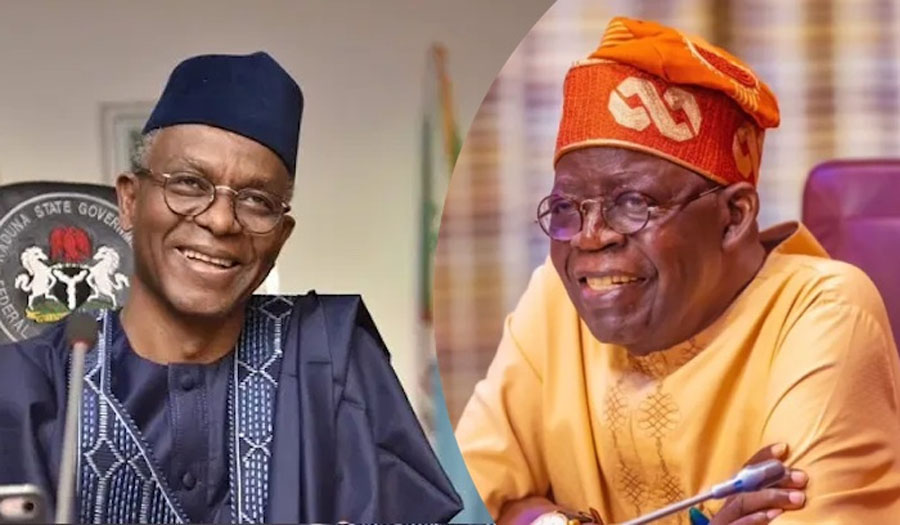
Tinubu, el-Rufai and the cobra
Tunde Odesola
(Published in The PUNCH, on Friday, February 20, 2026)
If they were not venomous, snakes would probably garland the necks of the rich and the influential to delineate social class. With a body handwoven by its Creator, the snake is the most awesome creature, epitomising engineering fluidity among wildlife. Its fleeting mobility, intricate symmetry, stretchy sinews, delicate precision and frightening fatality define a brute created without hurry.
If the Creator, in His infinite creativity, had swapped the rabies of the dog for the venom of the snake, the faintest bark would have sent feet fleeing, sticks wielding, and alarum bells ringing. Armed with just rabies as a weapon, the snake would have been handpickable like snails after rainfall; slithering and spitting alone do not deter like venom strike. Meat and skin, snakes are attractive.
If its venom was exchanged for rabies, the snake would probably have been Man’s best friend, barking through a slit mouth and narrow throat, without a noise. Before closing production on the evening of the Sixth Day, God assessed His production line; behold all things were bright and beautiful. So, he rested on the Seventh Day.
But Man and snake are not friends; one strikes the head, the other strikes the heel. This eternal enmity results in deaths within both camps, with the human casualty dripping with grief, while snakedom is griefless – Ọ̀dájú lọmọ ejò.
On the last day of January 2026, fast-rising soprano singer, Ifunanya Nwangene, curled up in bed, enjoying a sleep in her Abuja apartment. Later, a cobra crawled into bed with her. Ifunanya probably felt the snake crawl over her arm, and she tried to move her arm away from the uninvited visitor. When the cobra sensed that the arm, which was inanimate a while ago, was slowly becoming animate, it panicked and lashed out, sinking its fangs into the songbird’s wrist. With that split-second strike, the cobra blew out Ifunanya’s candles.
In minutes, a numbing pain in the wrist woke the songster up. She saw the bite and the swelling. Frantic, she made a call to her father, uncle and friends. This must be a bad dream, Ifunanya thought. Wake up, wake up, girl! But the Nightingale was slipping away. Death has crept in right in the safety of her room.
Following Ifunanya’s death, the BBC, in a February 7, 2026, story headlined “A singer’s tragic death highlights Nigeria’s snakebite problem,” reveals the controversy that trailed Ifunanya’s death. In the report, Ifunanya’s father, Christopher Nwangene, accused the Federal Medical Centre, Jabi, Abuja, of unprofessional treatment and lacking antivenom when she was rushed to the hospital. But the hospital refuted the allegations in a clap back, insisting that it had enough antivenom in stock and that Ifunanya received good treatment. The Chief Medical Director of the FMC, Saad Ahmed, explained that Ifunanya arrived over two hours after the snakebite. Ahmed’s allegation, however, beggars belief and raises the question: why would Ifunanya’s uncle and friend separately go in search of antivenoms and, indeed, buy some, if the hospital had the antidote?
READ ALSO:
- American Woman, 64, Alleges Embassy Mocked 27-Year-Old Fiancé Before Visa Denial
- Epstein, Ex-Israeli PM Named in Alleged Profiteering From Boko Haram Crisis
- CBN Policies, Foreign Inflows Drive Naira to Two-Year Peak
A nationwide backlash left a populace lamenting the preventable loss of a special talent. Christopher said the hospital’s medical staff should not have removed the tourniquet tied to her wrist to limit the venom from spreading to other parts of her body when the hospital did not have enough antivenom. Though the use of a tourniquet is no longer advisable as treatment for snakebite because it can cause tissue damage and increase the risk of amputation, Ifunanya’s father insisted that it was better for her daughter to be amputated than to die.
In its characteristic fire brigade method, the Nigerian Senate, without setting a timeline, called on the Federal Ministry of Health and the National Agency for Food and Drug Administration and Control to ensure hospitals across the country were stocked with safe, effective and affordable antivenoms. The Senate’s hollow directive typifies the futility of an imam’s rumbling stomach when presented with a dish of pork.
The lack of direction and commitment in the Senate directive on antivenom explains the lackadaisical legislation the nation gets when issues involve the masses, while diligence and speed attend legislation on issues that directly benefit lawmakers like constituency projects, car purchase and accommodation. The energy and time deployed by the Senate leadership under High Chief Godswill Akpabio to fight the Soyoyo from Kogi State, Senator Natasha Akpoti-Uduaghan, encapsulates the NFA metaphor of my youth. In my secondary school days, unserious students were called NFA, an acronym for No Future Ambition. Can the Nigerian masses attest that their National Assembly yesterday, today or tomorrow truly has people-oriented ambition, except talk loudly, cackle heartily, defect, and look towards the Presidency for patronage?
The venom economy, when measured through anti-venom and venom-derived therapeutics, is a multi-billion-dollar, fast-growing global market with respectable profitability driven by healthcare demand, innovation, and rising global incidence of venomous encounters. Nigeria, with its multitude of youth unemployment should tap into the global-venom market, but its clueless political class will not ensure any life-changing policy to push unemployment back.
When he was Health Minister six years ago, a former Speaker of the Lagos House of Assembly, Dr Olorunnimbe Mamora, described as ‘epidemic proportions’, the 20,000 snakebites recorded annually in Nigeria. That was six years ago. Today, the Toxinological Society of Nigeria says snakebite cases in Nigeria annually have climbed up to 43,000, making the need to produce antivenoms locally a matter of national duty. The Association of Community Pharmacists of Nigeria estimates that the country spends about $12million yearly importing antivenoms. A vial of imported antivenom, according to the BBC,costs between N45,000 and N80,000, necessitating the need for local production, export and job creation. But in Mamora’s alarm lay an underlying potential for the country to partake in the multi-billion-dollar global venom market, which included participants like scorpions, spiders, wasps, ants, etc.
The BBC report states that Nigeria’s snakebite “epidemic proportions” is “compounded by a critical shortage of affordable antivenom, which needs to be stored in fridges – often impossible in areas with unreliable electricity”. However, herbal medicine produced locally by traditional medicine practitioners does not need refrigeration. A 2005 study, “Effect of Annona senegalensis rootbark extracts on (cobra) Naja nigricotlis venom in rats,” published in the peer-reviewed Journal of Ethnopharmacology, showed the relative effectiveness of the rootbark of African custard apple in treating cobra venom.
READ ALSO:
- Edo Governor Okpebholo Names Mercy Johnson-Okojie Special Adviser
- Many Feared Dead as Suspected Lakurawa Militants Attack Kebbi Communities
- AMAC Polls Shock: Another PDP Candidate Withdraws from FCT Race, Backs APC
While the nation grappled with insecurity, hunger and poverty, there came a rumble from outside Aso Rock. A little mallam, Nasir el-Rufai, sat on a huge pile of peddles, singing a Fulani song, pelting the roof of the Villa with his pebbles. Aso Rock panicked. The embers of a recent coup are still glowing. When a fly perches on the scrotal sack, caution becomes the first commandment.
I daresay the former Kaduna State governor was the most vocal vendor of the Bola Tinubu electoral commodity to the North when members of the Fulani hegemony were afraid to openly side with the presidential candidacy of Tinubu while President Muhammadu Buhari reigned. Short men and daring deeds.
When everyone was afraid of Buhari, El-Rufai showed dogmatic courage and stood by his belief. And Tinubu won. After Tinubu’s victory, el-Rufai danced to Kizz Daniel’s Buga song with Tinubu over dinner. While Tinubu was bugga-ing in owambe fashion, el-Rufai was waltzing to Buga in the Fulani stick-across-the-neck dance style. I watched the dance again today. Laugh catch me. Between Tinubu and el-Rufai, someone was scratching their nose with the head of a cobra.
Before or after the deceitful dance, Tinubu publicly begged el-Rufai to come and work in his administration, and el-Rufai said he would work on a part-time basis because he had some personal issues to attend to. When Tinubu was compiling his list of ministers, el-Rufai also submitted his cv, but his name was shockingly flagged by security agencies.
I do not know what the mallam did to offend Jagaban, but I guess the President is just uncomfortable with the personality of the former governor. He probably sees Nasir as a stormy petrel who would be uncontrollable if allowed into the cabinet. The moral question that bubbles up from the depth of virtueless politics, therefore, is: “Why enlist el-Rufai to fight your battle when you knew you were going to dump him?”
Well, Nigerian politics lacked virtue before, during, and after the days of el-Rufai as Kaduna governor. In the murky waters of politics, fish eats fish, dog eats dog, snake eats snake. Tinubu is eating today; he might be eaten tomorrow.
So, when you see El-Rufai vehemently criticise Tinubu, e get why. No bi because of God. When Tinubu abuses Abubakar Atiku, na cruise. When Peter Obi knack Tinubu apako, na content. If Atiku tear Tinubu, na paddy-paddy matter. Dem all sabi wetin dem dey do. Dem go fight, dem go settle.
Nigerians love sports, especially football. In Brazil, football employs 3.3 million people, generating about $2bn annually. In the 2023/2024 season, the Premier League generated $6.34billion. Nollywood and the Nigerian music world, without government initiative, have grown to international repute, generating millions of dollars.
So, instead of our elected politicians and public officials snaking from one party to another in almajeri fashion, there should be a concerted national effort geared towards providing the dividends of democracy to the masses. Perhaps they have forgotten what the dividends of democracy are, here they are: security, healthcare, education, employment, welfare, infrastructure, etc.
Email: tundeodes2003@yahoo.com
Facebook: @Tunde Odesola
X: @Tunde_Odesola
Tinubu, el-Rufai and the cobra
Opinion
El Rufai’s Arise News mind game with Ribadu, By Farooq Kperogi

El Rufai’s Arise News mind game with Ribadu, By Farooq Kperogi
El Rufai’s Arise News mind game with Ribadu, By Farooq Kperogi
-

 International2 days ago
International2 days agoCanada Opens New Express Entry Draw for Nigerian Workers, Others
-

 Politics17 hours ago
Politics17 hours agoPeter Obi Launches ‘Village Boys Movement’ to Rival Tinubu’s City Boys Ahead of 2027
-

 News24 hours ago
News24 hours agoPolice to Arrest TikToker Mirabel After She Recants False Rape Claim
-

 News3 days ago
News3 days agoKorope Drivers Shut Down Lekki–Epe Expressway Over Lagos Ban (Video)
-

 Health3 days ago
Health3 days agoRamadan Health Tips: Six Ways to Stay Hydrated While Fasting
-

 Entertainment3 days ago
Entertainment3 days agoActress Destiny Etiko Breaks Silence on Alleged Nollywood Betrayal
-

 International1 day ago
International1 day agoEpstein, Ex-Israeli PM Named in Alleged Profiteering From Boko Haram Crisis
-

 metro2 days ago
metro2 days agoOsun Awards 55.6km Iwo–Osogbo–Ibadan Road Project to Three Contractors





